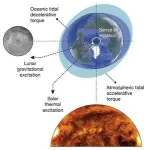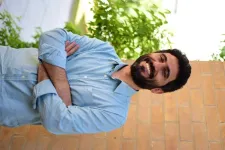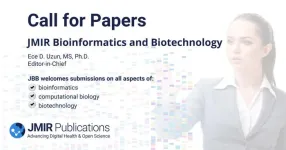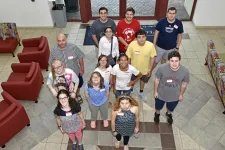(Press-News.org) It's tough accomplishing everything we want to get done in a day. But it would have been even more difficult had we lived earlier in Earth's history.
Although we take the 24-hour day for granted, in Earth's deep past, days were even shorter.
Day length was shorter because the Moon was closer. "Over time, the Moon has stolen Earth's rotational energy to boost it into a higher orbit farther from Earth," said Ross Mitchell, geophysicist at the Institute of Geology and Geophysics of the Chinese Academy of Sciences and lead author of a new study published in Nature Geoscience.
"Most models of Earth's rotation predict that day length was consistently shorter and shorter going back in time," said Uwe Kirscher, co-author of the study and a research fellow now at Curtin University in Australia.
But a slow and steady change in day length going back in time is not what Mitchell and Kirscher found.
How do researchers measure ancient day length? In past decades, geologists used records from special sedimentary rocks preserving very fine-scale layering in tidal mud flats. Count the number of sedimentary layers per month caused by tidal fluctuations and you know the number of hours in an ancient day.
But such tidal records are rare, and those preserved are often disputed. Luckily, there's another means of estimating day length.
Cyclostratigraphy is a geologic method that uses rhythmic sedimentary layering to detect astronomical "Milankovitch" cycles that reflect how changes in Earth's orbit and rotation affect climate.
"Two Milankovitch cycles, precession and obliquity, are related to the wobble and tilt of Earth's rotation axis in space. The faster rotation of early Earth can therefore be detected in shorter precession and obliquity cycles in the past," explained Kirscher.
Mitchell and Kirscher took advantage of a recent proliferation of Milankovitch records, with over half of the data for ancient times generated in the past seven years.
"We realized that it was finally time to test a kind of fringe, but completely reasonable, alternative idea about Earth's paleorotation," said Mitchell.
One unproven theory is that day length might have stalled at a constant value in Earth's distant past. In addition to tides in the ocean related to the pull of the Moon, Earth also has solar tides related to the atmosphere heating up during daytime.
Solar atmospheric tides are not as strong as lunar oceanic tides, but this would not always have been the case. When Earth was rotating faster in the past, the tug of the Moon would have been much weaker. Unlike the pull of the Moon, the Sun's tide instead pushes Earth. So while the Moon slows Earth's rotation down, the Sun speeds it up.
"Because of this, if in the past these two opposite forces were to have become been equal to each other, such a tidal resonance would have caused Earth's day length to stop changing and to have remained constant for some time," said Kirscher.
And that's exactly what the new data compilation showed.
Earth's day length appears to have stopped its long-term increase and flatlined at about 19 hours roughly between two to one billion years ago—"the billion years," Mitchell noted, "commonly referred to as the 'boring' billion."
The timing of the stalling intriguingly lies between the two largest rises in oxygen. Timothy Lyons of the University California, Riverside, who was not involved in the study, said, "It's fascinating to think that the evolution of the Earth's rotation could have affected the evolving composition of the atmosphere."
The new study thus supports the idea that Earth's rise to modern oxygen levels had to wait for longer days for photosynthetic bacteria to generate more oxygen each day.
END
19-hour days for a billion years of Earth’s history: Study
2023-06-12
ELSE PRESS RELEASES FROM THIS DATE:
New method enables study of nano-sized particles
2023-06-12
Researchers at Karolinska Institutet have created a new method of studying the smallest bioparticles in the body. The study, which is published in Nature Biotechnology, has considerable scientific potential, such as in the development of more effective vaccines.
Circulating around the body are nanoparticles that affect it in one way or another. For example, there are lipoproteins that maintain cell metabolism, pathogenic viruses that cause many diseases and lipid nanoparticles that are used to carry drugs, like recent lipid nanoparticle-based mRNA vaccines.
However, ...
Unveiling quantum gravity: New results from IceCube and Fermi data
2023-06-12
In a study published in Nature Astronomy today, a team of researchers from the University of Naples “Federico II”, the University of Wroclaw, and the University of Bergen examined a quantum-gravity model of particle propagation in which the speed of ultrarelativistic particles decreases with rising energy. This effect is expected to be extremely small, proportional to the ratio between particle energy and the Planck scale, but when observing very distant astrophysical sources, it can accumulate to observable levels. The ...
State agencies grant nationwide access to ultrasound disinfectant from Parker Labs
2023-06-12
FAIRFIELD, NJ—Parker Laboratories Inc. has announced that the environmental protection and pesticide control agencies of all 50 states have authorized registration of Tristel DUO, an intermediate-level disinfecting foam for the cleaning and disinfection of general medical surfaces—including noninvasive ultrasound transducers and their related equipment.
Tristel DUO is manufactured and distributed for US markets by Parker Laboratories under an exclusive commercial partnership with UK-based infection prevention company Tristel plc. Parker Laboratories ...
Researchers: win up to $40K studying effects of lipoprotein(a) on cardiovascular disease, stroke risk
2023-06-12
DALLAS, June 12, 2023 — The American Heart Association, the world’s leading voluntary organization focused on heart and brain health, invites scientific researchers across the globe to compete in a new data challenge to better inform the scientific understanding of how lipoprotein(a) [Lp(a)] levels impact the risk of cardiovascular disease and stroke. The winning project is eligible to receive a $40,000 USD cash prize.
High levels of Lp(a) — a low-density lipoprotein variant containing a protein called apolipoprotein(a) ...
Revolutionizing cardiology: AI-based technology offers accurate analysis of cardiac disease
2023-06-12
(Toronto, June 12, 2023) – New research published in JMIR Cardio reveals the remarkable potential of artificial intelligence (AI) technology in analyzing coronary angiography, a common diagnostic procedure for coronary artery disease. Led by Dr In Tae Moon, the study conducted at Uijeongbu Eulji University Hospital in Korea showcases the power of AI-based quantitative coronary angiography (AI-QCA) in enhancing clinical decision-making.
The study compared AI-QCA to intravascular ultrasound (IVUS), to validate its performance. IVUS is ...
Call for papers: JMIR Bioinformatics and Biotechnology
2023-06-12
JMIR Bioinformatics and Biotechnology (JBB) is a leading, international, peer-reviewed journal that aims to publish high-quality original research articles, reviews, and perspectives on all aspects of bioinformatics, computational biology, and biotechnology.
We invite researchers, educators, and practitioners to submit their original research articles, reviews, and perspectives to JBB. Our scope includes but is not limited to:
Bioinformatics, including genomic variation detection algorithms, tools, and databases
Artificial ...
SwRI’s Dr. Natalie Smith receives ASME Dedicated Service Award
2023-06-12
“It is an honor,” Smith said. “The ASME Turbo Expo community has been a valuable part of my professional development and it has been a pleasure to give back." Since joining SwRI in 2016, Smith has performed aerodynamic design and testing of turbomachinery and advanced system analysis for programs related to power generation, aviation, oil and gas, and energy storage, including next-generation supercritical carbon dioxide power cycles.
Smith has also managed three long-duration energy storage projects, developing a pumped thermal energy storage (PTES) demonstration facility, conducting a techno-economic feasibility study of ...
Press registration open for hybrid ACS Fall 2023 meeting
2023-06-12
Journalists who register for the fall meeting of the American Chemical Society (ACS) will have access to about 12,000 presentations on topics including agriculture and food, energy and fuels, health and medicine, sustainability and more. ACS Fall 2023 is a hybrid meeting being held virtually and in-person in San Francisco on Aug. 13-17 with the theme “Harnessing the Power of Data.”
ACS considers requests for press credentials and complimentary registration to meetings from reporters (staff and freelance) and public information officers at government, nonprofit and ...
Loneliness, insomnia linked to work with AI systems
2023-06-12
Employees who frequently interact with artificial intelligence systems are more likely to experience loneliness that can lead to insomnia and increased after-work drinking, according to research published by the American Psychological Association.
Researchers conducted four experiments in the U.S., Taiwan, Indonesia and Malaysia. Findings were consistent across cultures. The research was published online in the Journal of Applied Psychology.
In a prior career, lead researcher Pok Man Tang, PhD, worked in an ...
FAU awarded $1.5 million teaching grant for adults with intellectual disabilities
2023-06-12
Florida Atlantic University’s College of Education has received a three-year $1.5 million grant through the Florida Center for Students with Unique Abilities (FCSUA) for the FAU Academy for Community Inclusion. The funds will help sustain the academy, an approved Florida Postsecondary Comprehensive Transition Program (FPCTP) that serves the community through continuing employment and independent living skills opportunities for adults with intellectual disabilities.
Unemployment and under-employment for people with intellectual disabilities far exceed the norm – less than 10 percent of adults with intellectual ...







